Giulietta Masina @ 100: Cabiria's perfect ending
 Monday, February 22, 2021 at 7:35PM
Monday, February 22, 2021 at 7:35PM 
Born 100 years ago in San Giorno di Piano, Giulietta Masina is one of the most indelible faces of Italian cinema. She started her career as a theatre and radio actress but, by the time her husband Federico Fellini made the transition from screenwriter to film director, Masina was ready to follow him on the journey to the big screen. Despite having worked for other such notable auteurs as Rossellini and Wertmüller, Masina's legacy is defined by her husband's pictures. He immortalized her in more ways than one, both creating film monuments to her humanity, and using their marital strife to create many a celluloid drama...
Some of the films this pair made are among the greatest of all-time, and Masina's performances are some of the most transcendent ever recorded by a camera. To celebrate the actress' centennial, why don't we take a look at one of those divine collaborations? Specifically, I'd like to call attention to what's perhaps my favorite movie ending, that of the beautiful Nights of Cabiria.
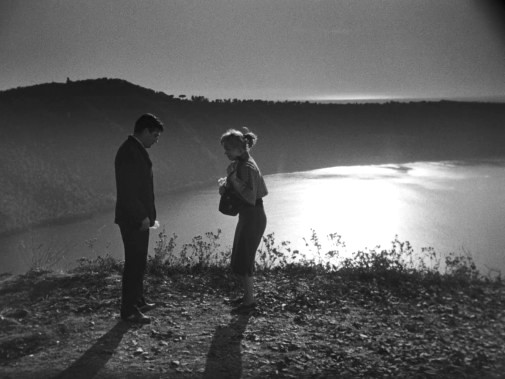
Winner of the Best Actress prize at Cannes and the Oscar for Best Foreign Language Film of 1957, Nights of Cabiria ends in much the same way it started, with its titular character robbed, heartbroken, and left for dead. An ever-smiling prostitute living in the outskirts of postwar Rome, Cabiria's life is a series of tribulations, indignities, and a continuous pursuit for true love. She first appeared in the director's 1952 The White Sheik and left such a great impression he decided to revisit the figure years later. While her film(s) may exist within a tradition of Neorealism, our protagonist is as romantic as the dreamiest confections of Hollywood escapism.
Her indefatigable hope is both her downfall and the only thing standing between her and complete despondence. It's also the only thing standing between Nights of Cabiria and misery porn. Like a Lars von Trier heroine, Cabiria suffers over and over again, tirelessly humiliated and disappointed by a society of inequalities where abuse gilded in unachievable glamour, the gold paint of religious piety, the vacuous fortune of the jet set. However, Fellini was always a more generous filmmaker than his younger Danish colleague and Cabiria is shot with the sort of warm kindness that would never be extended to the heroines of von Trier's Golden Heart trilogy.
The camera doesn't savor her fall from grace, its gaze always immersed in empathy, in the desire to see her stand up, resist, persevere. That's precisely what happens in the film's perfect ending when, after five episodes of sad misfortune, Cabiria suffers her most painful strike of bad luck. Just as the paramour who stole her purse and threw her in the river at the start of the flick, Cabiria's fiancée takes her to an isolated spot to rob her. The engagement, the promise of a golden future, all of it were lies and Cabiria realizes that even before the scoundrel confirms his evil doings. For some horrible minutes, it seems this is the straw that breaks the camel's back.
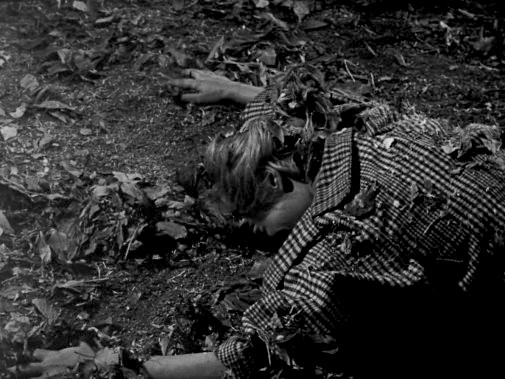
She throws the money at him, cries in despair, begs for her death, and rescinds her want to keep on living. At last, she has been defeated, her light snuffed out, her hope broken beyond repair. The man leaves Cabiria there, writhing on the ground, covered in dead leaves and dirt, a romantic clown whose smile melted off in a torrent of tears. Fellini's camera is always attuned to its heroine and, in the aftermath of her breakdown, it simply observes her body, lying face down, motionless.
The frame too is without movement, but we can almost feel the nervous energy vibrating from its patient repose. Just as the audience does, the camera pleads for the heroin to get up. If Cabiria herself has lost all hope, what about us? Is there a point in going on struggling? The souls outside and inside the screen synchronize then, a spark of magic igniting and spreading through Cabiria just as it spreads through the viewer's body, mind, heart. After unraveling before our eyes and seeming to die from heartbreak, Masina starts to move again. She rises.
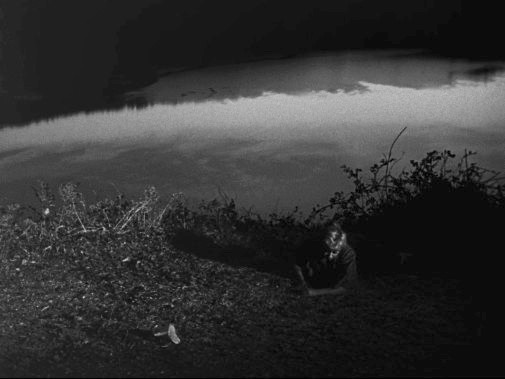
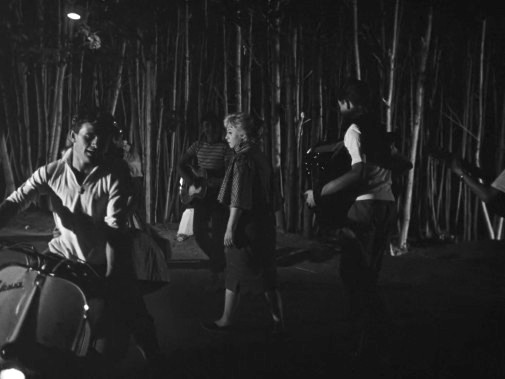
The middle point between a clown and a tragedienne, between Chaplin and Garbo, Giulietta Masina was a unique performer, and Cabiria's created to befit her abilities, especially the wild expressiveness of her body and the emotional subtleties she could invoke with her face. As Cabiria gets up, the actress telegraphs the struggles she's going through, physical and spiritual. Even before we see her visage, Masina makes her character's arc crystal clear, each gesture showing us a crumbled person building itself back up, the exhaustion of someone on the brink of defeat holding on to the ravine's edge with bloody fingers.
And then, as she walks from the shadow to the light, from the dirt to the road, we start to glimpse her face. On the street, revelers party, their music filling the silence, their dancing procession enlivening the traveling camera. Masina's Cabiria regards these happy folks and, instead of resenting them for being merry while she's miserable, the heroine becomes enraptured by their joy. Despite everything, she still has faith in humanity. Despite everything, she's still undefeated, even hopeful. It's not that Cabiria, Masina, the audience, or the film believe things will necessarily get better, but that people are amazing and life is precious, a miracle that should stupefy us with mirth even as it often proves itself to be a gaping hole to hell itself.
There's a lot of cynicism in Fellini's carnivalesque cinema, but there remains a warm heart to his celluloid nightmares. That heart is embodied by Cabiria. It's no surprise that Masina was always her husband's best muse. No other performer was ever able to translate the man's strange worldview with such seamless perfection, no other thespian could better challenge the darker sides of the auteur's imagination and inject sunny optimism into the penumbra. When Fellini pointed his camera at Masina, miracles happened, and the last shot of Nights of Cabiria is most magnificent of them all.
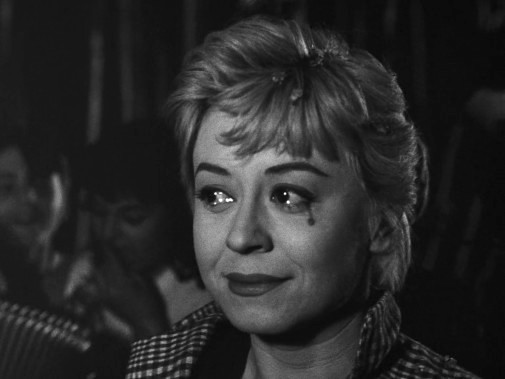
The wonder of humankind exists in the teary smile with which the actress illuminates the last few frames of the flick, all its mysteries encapsulated in a hopeful promise. Fellini said that, of all his characters, Cabiria was the only one he still worried about. As Giulietta Masina smiles at the camera, at the audience, she seems to say to us not to worry, that she'll be alright. Maybe it's a lie, but I want to believe her. Thanks to Masina's perfect performance, in that instant, before the screen fades to black, I do believe her. Thank you, Giulietta, for that morsel of incandescent hope.
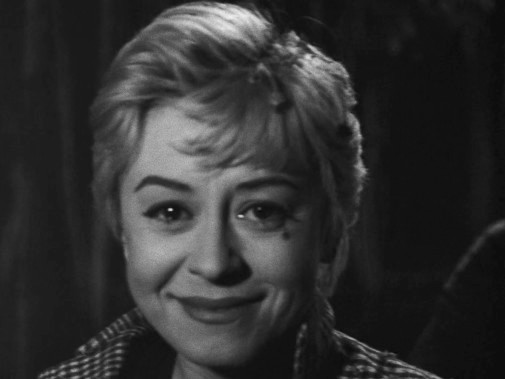
Nights of Cabiria is available to rent from most services.



Reader Comments (12)
I absolutely love this movie, primarily because of Masina. So luminous! And human! My other favorite Fellini is Juliet of the Spirits, which of course also stars Masina.
Nino Rota's tremendous music is also integral to the power of this sequence. This film is so dear to me, as it was one of the first films I saw in my teens that opened me up to the world of global cinema.
Correction... Friendly Persuasion by William Wyler won the Palme d'Or in 1957 though Massina did win the festival's best actress prize and the film won a special mention from the SIGNIS awards circle at the festival.
She's one of the absolute greatest. Both this and La Strada just boggle the mind as achievements both in acting and directing
Great article.
I wish she had made more movies as a leading lady.
She was also perfect in:
-La strada
-Juliet of the spirits
-Ginger and Fred
Masina & Magnani a strong match in “Nella città l’inferno” like a modern “Oz” or “ORANGE is The new black”.
Ps: Masina was Born in San Giorgio di Piano (Bo)
Masina gives one of my favorite performances in this incredible movie. Thank you for the article!
Ron -- Masina is also fabulous in JULIET OF THE SPIRITS. I don't love that film as much, but her performance is indeed great.
Jonathan -- Rota's music is a huge part of Fellini's cinema. I love his compositions for this film, but I wanted to focus on Masina. However, you're right that the swell of symphonic joy as Cabiria walks the street is very important to the overall effect of this perfect ending.
thevoid99 -- Thank you for pointing it out. I've already corrected it and I should have known better. I once wrote a gigantic article ranking all the Palme d'Or winners and remember being slightly horrified that FRIENDLY PERSUASION won over NIGHTS OF CABIRIA. Guess this mistake was a manifestation of wishful thinking on my part.
vigo -- She's amazing in both. It's a pity that AMPAS was allergic to rewarding great acting in Italian films apart from their occasional affection for Loren and Mastroianni. Magnani had to make American movies to be recognized.
Alex -- I have to watch that film. Thanks for the recommendation.
Daniel -- Thank you for the lovely comment.
Cláudio, when I learned Portuguese in Brazil I've discovered the incredible Caetano Veloso. He wrote a terrific song called Giulietta Masina.
cal roth -- My mom adores Veloso's music so I've heard that song numerous times. It's quite lovely. Thanks for mentioning it. Here's a link in case others want to give it a listen: https://www.youtube.com/watch?v=59ZSqBd7sLY
So, no Sweet Charity comparisons, anyone?
The fact that Sweet Charity gets repeat airings on TCM and not Nights of Cabiria really amazes me, as the "she lived hopefully ever after" ending really seems much more appropriate to apply to when exploring the journey of Cabiria than that of Charity.
In general, Hollywood has been, and, in all honesty, remains, slow to show the three-dimensionality of sex workers, but Fellini always knew how to showcase their experiences as a part of living in a society.
And Masina always knocked it out of the park with her material, never moreso than here. The fact that her Italian contemporaries Anna Magnani and Sophia Loren managed Oscar nominations and wins while she did not remains deeply disappointing.
She shld've been the 1st Foreign language performer to be nom for an Oscar!!
She bring such an unique charm n indomitable spirit to Cabiria, tt no other remakes can ever top this org film!
My best director n actress choice of 1957! 💜